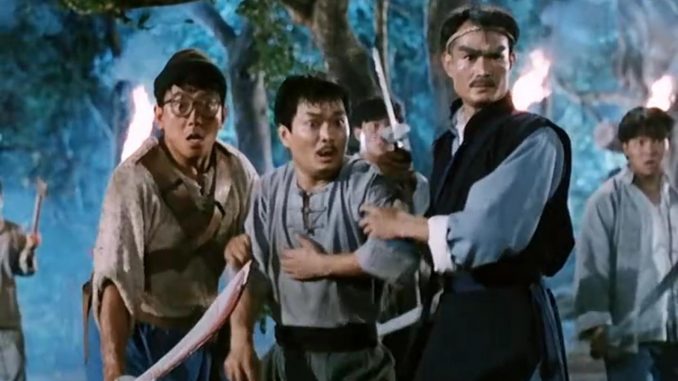
There were many great franchises to come out of Hong Kong in the eighties and nineties. The Police Story series. Once Upon a Time in China. A Chinese Ghost Story. In the Line of Duty. But I have a special place in my heart for the Mr. Vampire saga. There may be no better example of the genre-bending insanity which drew me into the world of Hong Kong cinema than the films which, by and large, introduced the West to the weird world of hopping vampires. This Chinese take on the fiends known as jiangshi (literally meaning “hardened body”), originated in the late 18th century. For example, essays by the scholar Ji Xiaolan, published after his death in a collection called Yuewei Caotang Biji. These outlined the various causes for a corpse returning to life, including being struck by lightning. Unlike their Western counterparts, they didn’t drink blood or lust for immortality.
The jiangshi did follow suit in also becoming popular literary topics. For example, of the 746 (!) short stories in the collection, What the Master Would not Discuss by Yuan Mei, thirty are about jiangshi in one form or another. Their first cinematic appearance was back in 1936, in the film Midnight Vampire, directed by Yeung Kung-Leung, and told a tale of revenge from beyond the grave, with a man returning to life to kill his brother. The decade also brought to the screens titles like Vampire of the Haunted Mansion and Three-Thousand-Year-Old Vampire (both 1939). Following the success of the Hammer adaptation of Dracula, there were subsequent attempts to bring Western-style vampires over to Hong Kong. Indeed, the British studio themselves joined forces with Shaw Brothers for 1974’s The Legend of the 7 Golden Vampires, which we will be reviewing as part of our Hammer project.
But it was the eighties where the genre really took off. An early precursor, which included a jiangshi as just one of its aspects, was 1980’s Encounters of the Spooky Kind, directed by and starring Sammo Hung. This established the combination of kung-fu and comedy genres, mixed with elements taken from traditional folklore, and its commercial success spawned no shortage of imitators. Inspired partly by stories he had heard from his mother, Hung then came up with the idea for Mr. Vampire, and brought on Ricky Lau to direct and help write. The production was not without incident, eventually costing almost double the intended budget. But the investment paid off, with Mr. Vampire grossing more than HK$20 million against its HK$8.5 million cost, becoming the #3 movie of the year. It was also nominated in 13 categories at the Hong Kong Film Awards. Sequels and spin-offs, official and otherwise, followed.
A key component is the presence of Lam Ching-Ying in almost all the films, typically as a Taoist priest whose knowledge is used to battle the jiangshi. His casting was a suggestion by Hung, who had worked with both Lam and Lau on The Prodigal Son. Like many Hong Kong stars of the era, Lam had learned his trade in a Peking Opera school, before moving to the film industry, working for Shaw Brothers while still a teenager. His subsequent jobs included being Bruce Lee’s personal assistant, and also being Han’s double in Enter the Dragon. While Lam died of cancer at the tragically early age of 44, he will always be remembered for his iconic performances in the Mr. Vampire franchise. Let’s take a look at the five “official” movies – plus a bonus Lam Ching-Ying film, which goes along very similar lines.
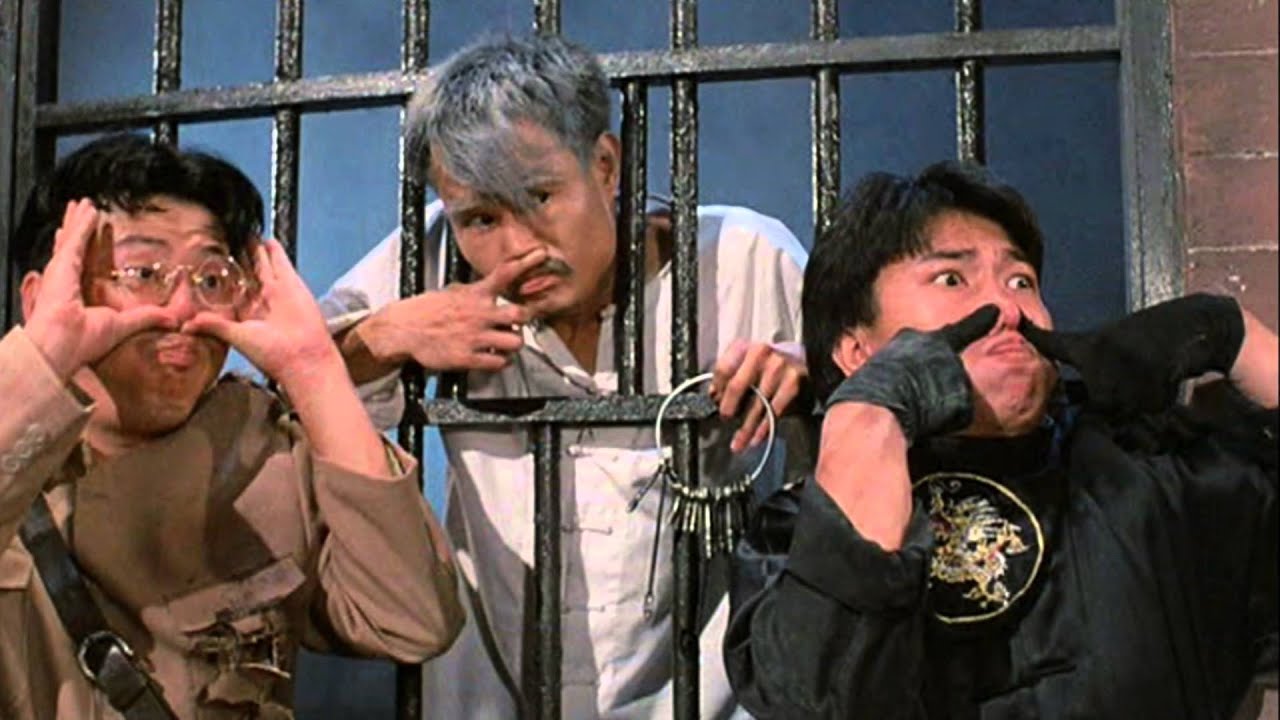
Mr. Vampire (1985)
Rating: B
Dir: Ricky Lau
Star: Lam Ching-ying, Ricky Hui, Chin Siu-ho, Billy Lau
The blending of horror and comedy is always a tricky proposition. Throw in the action genre as well, and you’ve got to perform a real juggling act to deliver on all three fronts. Not many do a better job than Mr. Vampire, right from an opening in which Man-Choi (Hui) and Chau-Sang (Chin), students of Taoist priest Master Kau (Lam), find themselves menaced by reanimated corpses. The long-suffering master has to restore order with his arsenal of magic, setting the stage admirably for the madness to come.
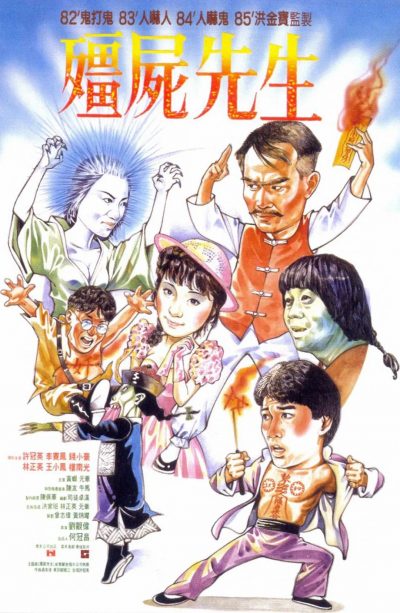 That begins when Kau is hired to advise on the re-burial of a wealthy businessman, in the hopes this will improve the family fortunes. However, it turns out the corpse is a vampire, and when his minions fail to bind the dead body adequately, it breaks loose, bringing hell with it. Kau is arrested and jailed by cowardly local cop Wai (Lau) after the murder of the businessman, actually carried out by his dead Dad. Meanwhile, Man-Choi has been bitten and is beginning to turn, while Chau-Sang has fallen for another supernatural entity, Jade (Wong Siu-fung), a ghost whose head can fly about independently of her body.
That begins when Kau is hired to advise on the re-burial of a wealthy businessman, in the hopes this will improve the family fortunes. However, it turns out the corpse is a vampire, and when his minions fail to bind the dead body adequately, it breaks loose, bringing hell with it. Kau is arrested and jailed by cowardly local cop Wai (Lau) after the murder of the businessman, actually carried out by his dead Dad. Meanwhile, Man-Choi has been bitten and is beginning to turn, while Chau-Sang has fallen for another supernatural entity, Jade (Wong Siu-fung), a ghost whose head can fly about independently of her body.
Imagine watching, say, Blade II, with absolutely no knowledge of Western vampires. It would be incredibly confusing, and you’d just have to hang on for dear life and enjoy the ride. That’s what this feels like; I can only presume it all makes perfect sense to the local audience, familiar with things like the jiangshi, the creatures of Chinese folklore that are a cross between zombies and vampires. And who, it appears, can’t see anyone who is holding their breath (top). Oh, and did I forget to mention, sticky rice will suck the poison out of wounds they inflicted? Okay…
It’s just so much fun, you can’t help but cut it slack, despite obvious weaknesses. For example, the film seems to get bored of Jade, who literally flies out of the film, and some of the comedy, especially around Wai, falls flat as a pancake. I’ll even forgive them the shameful waste of Moon Lee, playing a role that mostly requires her only to look pretty, rather than kick arse as she would go on to do. Though she is part of the movie’s funniest scene, in which she ruthlessly exposes Lam’s ignorance of Western beverages and their consumption.
The action is really well-staged too, with the three leads bouncing around like spell-casting rubber balls, slapping magic scrolls on undead forehead. Lam is particularly impressive. He has the same quiet on-screen presence as Peter Cushing, and can sell the questionable nature of the events unfolding, through his character’s knowledge of and belief in them. The fact he is calm in the face of the most WTF? moments marks him as a true hero. It’s easy to see why this was both a critical and commercial smash at the local box-office, and spawned not only the subsequent sequels, but also a host of knock-offs along similar lines.
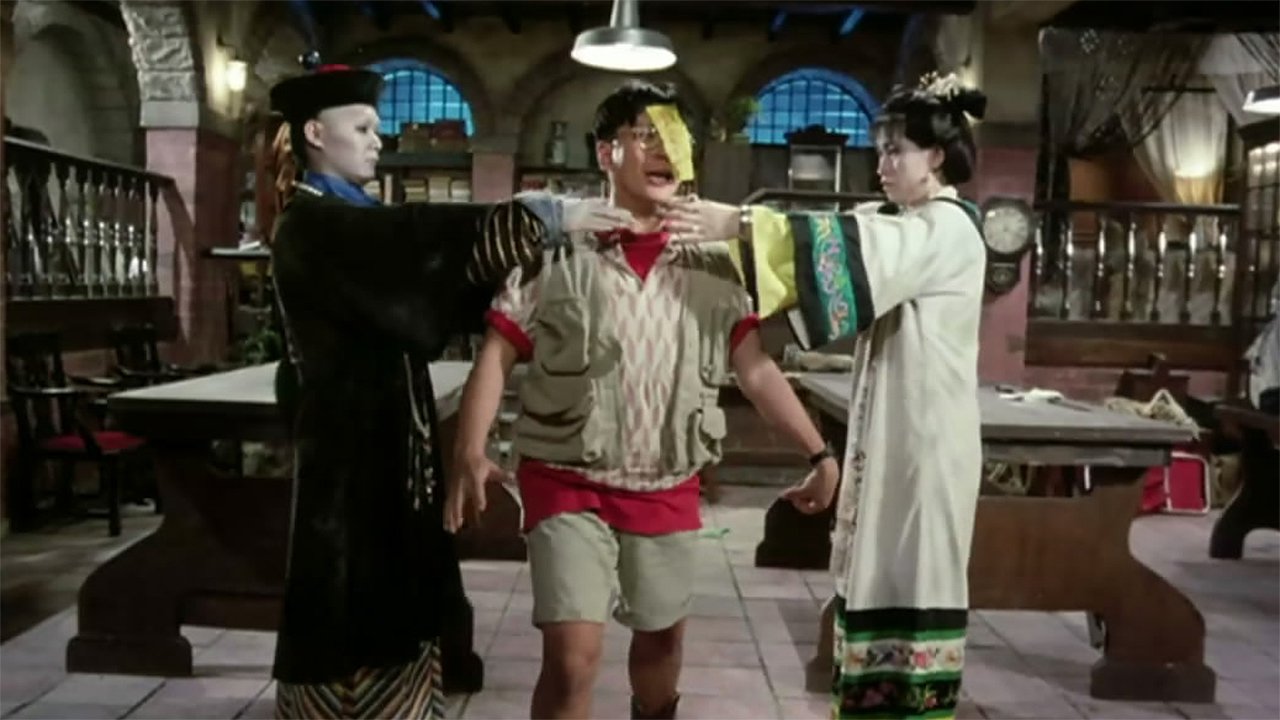
Mr. Vampire II (1986)
Rating: C-
Dir: Ricky Lau
Star: Lam Ching-ying, Yuen Biao, Chung Fat, Billy Lau
I recall hating this the first time I watched it. Not quite so much now, though it’s still a long way short of its predecessor, and makes some very, very poor decisions. It’s certainly different, not least for being set in the modern era. Archaeologist Professor Kwok Tun-wong (Fat) discovers a “family” of three vampires – daddy, mommy and son – on a dig, and takes them back his lab to study. The boy escapes and, in a plot shamelessly ripped off from E.T., finds sanctuary with a young girl. Meanwhile, Kwok’s intern, Chicken (Lau) gets bitten by one of the adult vampires. Seeking treatment, he goes to herbal doctor Lam (Lam), who recognizes the injury for what it is. Together with reporter Yen (Yuen), he seeks to help the vampires “into an early, happy re-incarnation,” as the subs euphemistically put it.
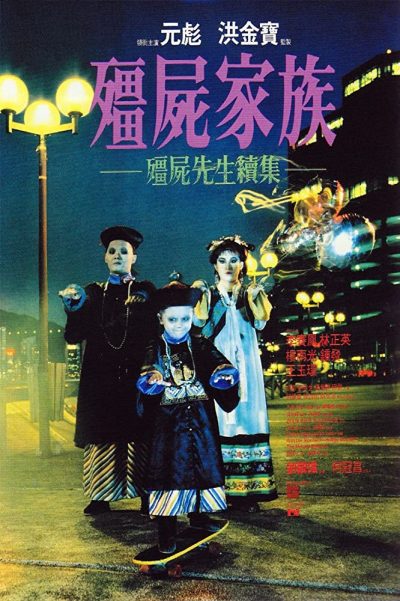 The first hour of this borders on the excruciating. The director is no Stephen Spielberg, and his efforts to imitate arguably Spieberg’s greatest work are ill-founded and badly executed. The whole front half feels like it’s aimed at an 8-year-old with low standards, right down to the musical montage. If you survive this – and I’d not blame you if you didn’t – you then get a sequence in which Yen and Lam battle Mom and Dad in fake slow motion, after cracking open a large bottle of “retardant”. It’s amusing for about 30 seconds. Pity, therefore, it lasts about 15 minutes. And never mind wasting Moon Lee (reduced here to a role as Lam’s daughter), the film wastes Lam, who has only about two scenes in the first hour. And that’s including the slo-mo one.
The first hour of this borders on the excruciating. The director is no Stephen Spielberg, and his efforts to imitate arguably Spieberg’s greatest work are ill-founded and badly executed. The whole front half feels like it’s aimed at an 8-year-old with low standards, right down to the musical montage. If you survive this – and I’d not blame you if you didn’t – you then get a sequence in which Yen and Lam battle Mom and Dad in fake slow motion, after cracking open a large bottle of “retardant”. It’s amusing for about 30 seconds. Pity, therefore, it lasts about 15 minutes. And never mind wasting Moon Lee (reduced here to a role as Lam’s daughter), the film wastes Lam, who has only about two scenes in the first hour. And that’s including the slo-mo one.
In the film’s defense, the last thirty minutes is considerably more rousing, delivering much more what we’d expect. A firefight around a truck carrying the parent vampires is rather good, ending with them hopping their way down a line of cars to freedom. They then head off in search of baby, to the apartment where he is holed up with his adopted family, leading to another decent battle there. Amusingly, Lam talks his way in there past the police by presenting his credentials in a nicely deadpan bit of self-awareness, name-checking a number of famous Hong Kong horror-comedies: “My master Sammo [Hung was a producer on the series] had Spooky Encounters, now he has met The Dead and the Deadly. Last year I caught a Mr. Vampire.”
But if ever it were a case of too little, too late, this is it. Indeed, in terms of a sequel which had the same director and star, I’m hard pushed to think of a bigger quality drop-off from the original. The Matrix to The Matrix Reloaded maybe? While the first film managed to strike an impeccable balance between its elements, this manages to forget it’s a horror movie almost entirely until almost an hour has gone by. Even the action elements are muted, with preference given instead to sickly sweet family entertainment. No, thank you.
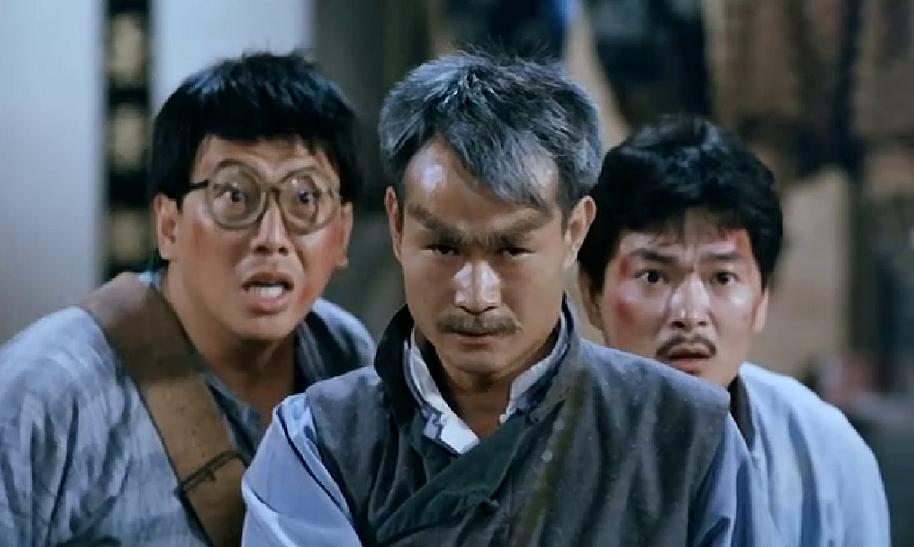
Mr. Vampire III (1987)
Rating: B-
Dir: Ricky Lau
Star: Richard Ng, Lam Ching-ying, David Lui, Pauline Wong
A blessed return to the basics, this largely abandons the family-oriented approach of the previous installment. No musical montages, hooray! Instead, we get Richard Ng as Uncle Ming, a Taoist priest who stages fake exorcisms with the aid of two “pet” ghosts. Hmm, I wonder if Peter Jackson saw this, for it’s strikingly close to the basic plot of The Frighteners. After being run out of one town, they move on, but their new location drops them in the middle of a war. One side are the townsfolk, led by the rather more magically gifted Uncle Nine (Lam). On the other, a gang of brigands under the literal spell of Devil Lady (Wong), a powerful sorceress. Let occult battle commence.
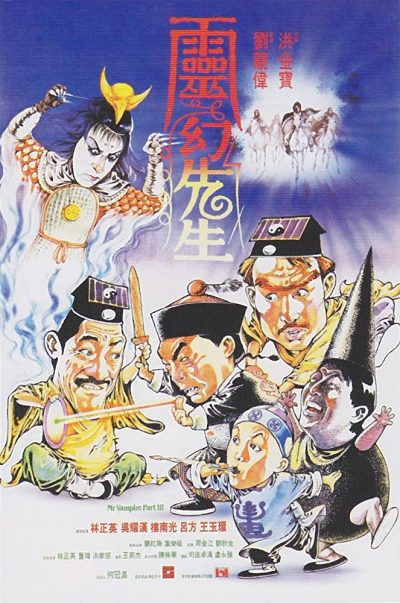 You may have noticed the lack of any actual vampires in that synopsis, and that’s fair criticism. In its native home, the title translates as Mr. Spiritual Fantasy, which is likely more accurate. This is still a good deal of fun, even if it feels like Ming is the focus of the movie’s attention rather than Nine. It’s the former whose story the film follows, and he gets considerably more to do. Not least because he’s capable of getting his arse repeatedly handed to him by Devil Lady and her minions, until Nine rides to the rescue, as appropriate to the plot, and saves the day.
You may have noticed the lack of any actual vampires in that synopsis, and that’s fair criticism. In its native home, the title translates as Mr. Spiritual Fantasy, which is likely more accurate. This is still a good deal of fun, even if it feels like Ming is the focus of the movie’s attention rather than Nine. It’s the former whose story the film follows, and he gets considerably more to do. Not least because he’s capable of getting his arse repeatedly handed to him by Devil Lady and her minions, until Nine rides to the rescue, as appropriate to the plot, and saves the day.
There is certainly a great deal of new lore here: for example, you can tell a victim of possession because their heels don’t touch the floor, due to their paranormal passenger. One particular standout is the notion that coating yourself in tar makes you invisible to ghosts. However, if you’re doing so to yourself, you’re almost guaranteed to miss bits. Let’s just say, if you ever wanted to see Richard Ng’s buttocks, this is the film for you. It’s also possible to destroy ghosts permanently by deep-frying them, though since this is a permanent block on the spirits ever resurrecting, it’s considered a punishment of last resources. And woe betide you if they are not cooked thoroughly enough. Because it appears you then end up with something which looks like a mummy made from melted marshmallow, and understandably in possession of a really bad attitude.
A shout-out is due to Wong, who makes a good impression with her villainous presence, despite not having any real lines to say. The scene where she summons a flock of bats is downright creepy, and likely more effective than Hammer’s efforts in this area. Also keep an eye out for Nine’s birthday party scene, including cameos by a bunch of familiar faces, such as Sammo Hung, Wu Ma and Corey Yuen. If III is arguably little more faithful in content to the original than II was, it is considerably closer in spirit, and in striking the cross-genre balance. Still a little too much dumb slapstick perhaps, especially from the unfunny mugging by Nine’s student Chiang (Billy Lau). Yet the good outweighed the bad more than acceptably for me.
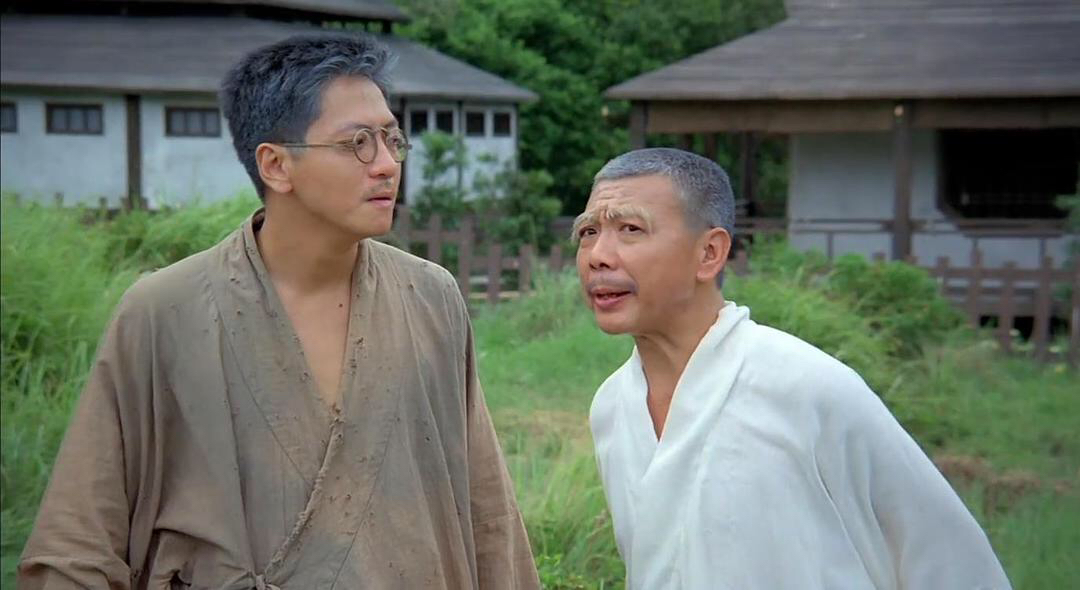
Mr. Vampire IV (1988)
Rating: B-
Dir: Ricky Lau
Star: Anthony Chan, Wu Ma, Chin Kar-lok, Loletta Lee
No Lam Ching-Ying? No problem! That appears to be the motto for this one, in which our favourite unibrowed Taoist priest is notable by his absence: the Chinese title translates as Uncle Vampire, perhaps hinting at a familial stand-in. Instead, we get a clash of theologies, in the forms of Buddhist monk Master Yat-yau (Wu) and a priest (Chan) called simply “Four-eyed Taoist” in the IMDb, presumably due to his glasses. They don’t like each other very much, so it’s kinda odd that they’ve ended up living next to each other in the middle of a forest, along with their respective disciples, JingJing (Lee) and Kar-lok (Chin). Moderate shenanigans initially ensue, such as Four-eyes using magic to make Yat-yau his puppet. The duelling breakfast is quite amusing.
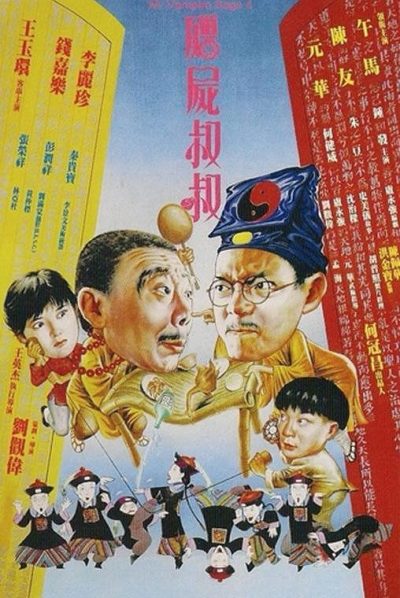 Things ramp up considerably on the arrival of a funeral procession, accompanied by a pal of Four-eyes. He’s the guard for a young prince and his flamingly effeminate adviser, and informs Four-eyes the coffin contains a vampire. A convenient storm washes the coffin clean of the magical talismans keeping the creature inside, and before long our two priests are besieged by a small army of undead, under the control of the big bad – not the least of which is one flamingly effeminate vampire. Our two rivals are going to have to combine their forces and their talents, if they and their acolytes are going to make it through the night.
Things ramp up considerably on the arrival of a funeral procession, accompanied by a pal of Four-eyes. He’s the guard for a young prince and his flamingly effeminate adviser, and informs Four-eyes the coffin contains a vampire. A convenient storm washes the coffin clean of the magical talismans keeping the creature inside, and before long our two priests are besieged by a small army of undead, under the control of the big bad – not the least of which is one flamingly effeminate vampire. Our two rivals are going to have to combine their forces and their talents, if they and their acolytes are going to make it through the night.
This was the first in the series I ever saw, back at the good ol’ Scala cinema, and it has largely stood the test of time. I certainly didn’t miss Lam as much as I thought I might. It perhaps makes a difference that the Taoist priest here, Four-eyes, is a bit of a dick. He’s clearly the instigator for much of the feud and also treats Kar-lok rather cruelly. This wouldn’t really fit the more kindly persona put forward by Lam in his portrayals [not that he suffers fools gladly for his apprentices, but is at least fair with them], so a different actor works well. Wu is considerably more sympathetic, but it’s interesting to see the two religions put aside their spiritual differences and come together to face a common enemy. There is clearly more than one way to skin a vampire.
The genres aren’t blended quite as successfully here: the first half is mostly comedy, albeit occasionally quite physical, while the second is considerably more skewed toward action and horror (though I did laugh at Four-eyes giving Yat-yau a “fun-sized” sword, while keeping the industrially-dimensioned weapon for himself). I was definitely more impressed the further this went on: the gay jokes in particular haven’t aged well, though I’m not sure the old “kissing under the guise of artificial respiration” gag was ever all that funny, even in 1988. But once the top blows off the coffin, the film hits its stride, with everyone getting to share the spotlight. There’s hardly chance to pause for breath the rest of the way, until the final (somewhat abrupt) freeze-frame finish.
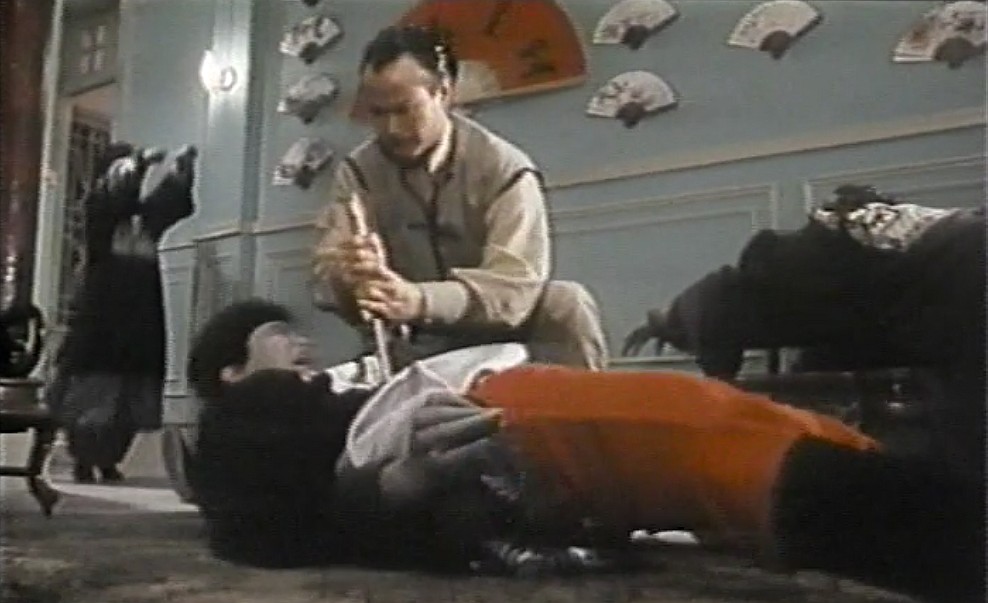
Mr. Vampire 1992 (1992)
Rating: C+
Dir: Ricky Lau
Star: Lam Ching-ying, Sandra Ng, Ricky Hui, Chin Siu-ho
a.k.a. Chinese Vampire Story
I may be going out on a limb here, but I suspect this is probably the world’s only pro-life hopping vampire horror film. For it opens with the following prologue, which I copied, exactly as is, from the subtitles: “Some people think that unborn baby does not possess a spirit. Therefore, many women committed crime by abortion and stillbirth. This makes a lot of fragile spirits lose the chance of transmigration. These spirits we called Holy Baby. If a Holy Baby failed to be reborn after several attempts, it would become enemy of man. It will become evil.” So we have Master Kau (Lam), who has a shrine filled with these spirits, which he and his henchmen, Man-Choi (Hui) and Chau-Sang (Chin), keep in check. Well, mostly.
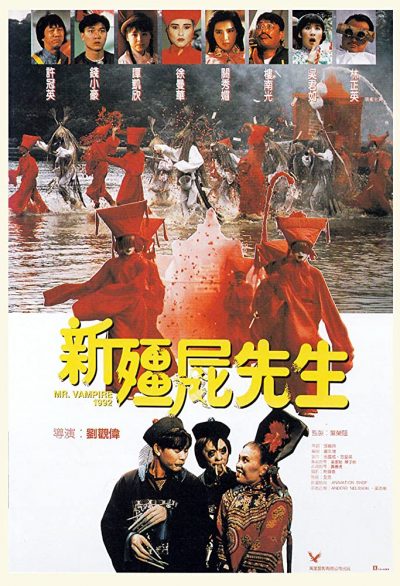 For one of these Holy Babies escapes, possessing the maid to the pregnant Mai Kei-lin, intent on then taking over her unborn child. Fortunately, Kau is in the area, because her husband, a general in the army, is being turned into a vampire by his late father – a result of dad’s coffin touching the ground, don’t you know. To fix the general, Kau needs vampire tooth powder, so Man-Choi and Chau-Sang are sent to get that. However, once that’s obtained, they then have to deal, not only with the Holy Baby but the vampires, who have followed the minions back to the general’s house. If your movie bingo card for this one also contains: lion dancing, copious small child urination, and an exploding sorceress, give yourself two points.
For one of these Holy Babies escapes, possessing the maid to the pregnant Mai Kei-lin, intent on then taking over her unborn child. Fortunately, Kau is in the area, because her husband, a general in the army, is being turned into a vampire by his late father – a result of dad’s coffin touching the ground, don’t you know. To fix the general, Kau needs vampire tooth powder, so Man-Choi and Chau-Sang are sent to get that. However, once that’s obtained, they then have to deal, not only with the Holy Baby but the vampires, who have followed the minions back to the general’s house. If your movie bingo card for this one also contains: lion dancing, copious small child urination, and an exploding sorceress, give yourself two points.
Much like Mr Vampire II, the early going here is tough, with attempts at comedy which fall completely flat. We’re talking “extended diarrhoea brought on by dodgy sushi” bad. [That is actually one topic of the humour, but it makes for a decent comparison as well] The presence of Ng, the queen of Hong Kong comic mugging, playing another spiritualist, Kwan-yue, should give you a clue where this aims. Though I’ll confess I did laugh at the human lazy Susan in the middle of the table, consisting of three slowly rotating soldiers, holding trays. Otherwise, it’s so entirely unfunny, I completely refused to tick the ‘comedy’ category box for this.
If you stick with it, however, it also follows the template of II, in that it does recover. There is a genuinely spooky sequence where Kwan-yue is attacked on the road by a spectral procession: like so much else here, don’t expect any explanation. Things also build to a grand finale which provides non-stop mayhem, as vampires, spiritualists and Holy Baby-possessed maids rampage and brawl round the general’s large, well-appointed house. Is it enough to negate the woefully bad stabs at comedy we say in the opening 30 minutes? Not entirely. But considering what grade this was heading towards at that point, reaching the dizzy heights of a C+ counts as a remarkable recovery. It’s testament to how good this whole franchise could be, when it set its mind in the right direction.
And a bonus review – not technically one of the franchise, but close enough to merit discussion.
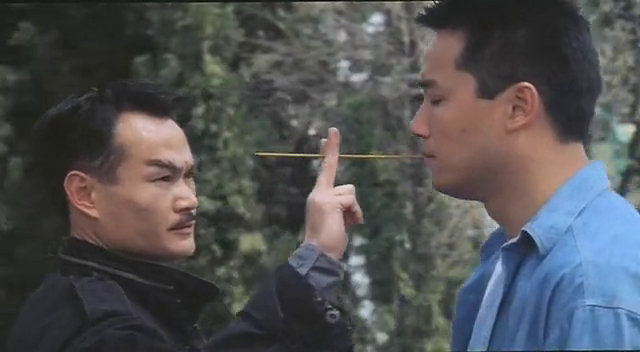
Magic Cop (1990)
Rating: B-
Dir: Stephen Tung
Star: Lam Ching-Ying, Wilson Lam, Michael Miu, Michiko Nishiwaki
a.k.a. Mr Vampire 5
Despite the alternate title, and the presence of the same actor playing a Taoist priest, this is not officially part of the Mr. Vampire franchise. It was made by a different production company, and without the input of Ricky Lau. However, it’s little if any less pleasant, and brings much the same melting pot of genres to the dining table. It’s certainly a great deal more successful in adapting the idea for the modern world than Mr Vampire 2. This plays a bit like a Hong Kong version of Dead Heat, with re-animated corpses being turned to criminal ends. The approach here is considerably less scientific though, with a Japanese sorceress (Nishiwaki) using black magic to bring the dead back to live for use in her drug-trafficking ring. When one of her couriers is caught in a police stakeout, only being stopped when hit by a truck, and is discovered actually to have died a week previously, it’s clear this is outside standard cop expertise.
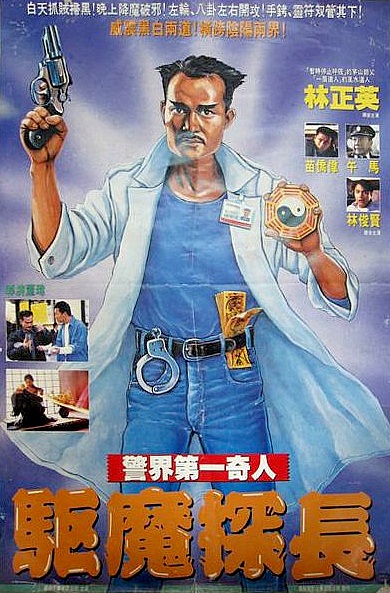 Enter Uncle Feng (Lam C-Y), a cop with a reputation for handling weird cases like this. He’s brought in to head office, and stays with a pair of more traditional cops; Detective Lam (W. Lam), who looks down on the “old-fashioned” ways of Feng, and one referred to in the IMDb as “Sergeant No. 2237” (Miu). Hey, at least he gets a name: the villainess is simply “The Sorceress”. Giving your characters a name: it’s clearly vastly over-rated. The first half is, it must be said, a little underwhelming, with not very funny comedic aspects such as Feng trying to protect his attractive young relation from the old-school sexist predation of Det. Lam, or adapting to sharing living space with the two younger officers. [The decor of their apartment features a gigantic Union Jack painted on one wall: I’m not sure if this was intended as some kind of oblique political statement]
Enter Uncle Feng (Lam C-Y), a cop with a reputation for handling weird cases like this. He’s brought in to head office, and stays with a pair of more traditional cops; Detective Lam (W. Lam), who looks down on the “old-fashioned” ways of Feng, and one referred to in the IMDb as “Sergeant No. 2237” (Miu). Hey, at least he gets a name: the villainess is simply “The Sorceress”. Giving your characters a name: it’s clearly vastly over-rated. The first half is, it must be said, a little underwhelming, with not very funny comedic aspects such as Feng trying to protect his attractive young relation from the old-school sexist predation of Det. Lam, or adapting to sharing living space with the two younger officers. [The decor of their apartment features a gigantic Union Jack painted on one wall: I’m not sure if this was intended as some kind of oblique political statement]
Fortunately, the movie shifts gear after the opening third toward the expected areas of horror and action. This starts with a trip to a health club where the veteran’s value is shown, Lam using traditional magic to follow a subject remotely. This brings them to the Sorceress’s lair, though she’s soon alerted to their presence, setting up a magical duel between her, inside, and Uncle Feng outside the building. [I’m just hoping the Sorceress’s white cat was a well-trained stunt feline, because it did not seem happy at some of the treatment it received…] There is another fun sequence in a morgue; this features Feng breathing genuine fire, not exactly something you’ll see many Hollywood stars do. Then it’s back to the lair for round two and a grandstand finale, exactly the kind of thing that made me fall in love with Hong Kong genre cinema to begin with. What the film may lack in budget – some of the optical effects have not aged well! – it certainly makes up for imagination.
[Original review] When cops try to arrest a suspected drug trafficker, she ends up getting run over. However, the autopsy show she died a week previously. Fortunately, they can call on the services of Lam (from Mr.Vampire – the one with the odd haircut), a combined cop/exorcist. His new partners are sceptical, until they see him in action, then they’re behind him 100%. Hiding, mostly, while he takes on Nishiwaki (rapidly rivalling Cynthia Khan as a favourite) who’s resurrecting the dead as her minions. I’ve seen ‘Zu’. I’ve seen ‘A Chinese Ghost Story’. I thought I’d seen everything. I hadn’t – my jaw spent most of this movie in my lap. A wonderful combination of cop thriller, black comedy and occult movie.
